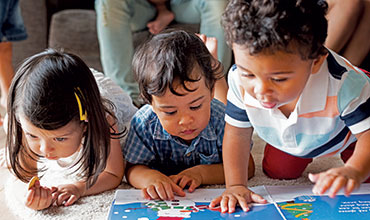The saying, “Little kids, little problems, big kids, big problems,” may be true in general, but when it comes to making important choices for our little kids, those choices can feel pretty big! Preschool is your child’s first formal learning experience, and it’s likely that you feel some pressure to pick the “right” school. Here are some things to consider when making your choice:
Play-based vs. Academic
Little did you know that choosing your child’s preschool would involve a philosophical question! In choosing a program, you’ll want to consider both your child’s personality and interests, as well as your own desires for your child’s early education.
In a play-based school, also known as a “child-centered” or “child-centric” school, a large amount of time is dedicated to free play and unstructured activities. Teachers monitor and encourage play, helping the children to develop social skills. They will also lead group art, storytime or science activities. Early literacy concepts, such as letter, shape and number recognition as well as basic handwriting, are often taught, although somewhat organically.
In an academic program, the environment is more structured, students are expected to participate in planned activities, and they spend a significant part of their day sitting and working. Children are actively taught to perform basic math and to recognize shapes, colors, letters and letter sounds, with the goal of preparing for kindergarten.
There is no one right choice. Some children enjoy the less-structured nature of a play-based program and benefit from the social skill development that it offers, while others do best with a very structured environment or need more time to work on their letters and numbers.
Research shows that while an academic-based program confers some test score benefits for students entering kindergarten, the gap is closed for most by the end of kindergarten and for all students by the end of first grade.
Other Considerations
Once you’ve chosen your preferred philosophy, there are other criteria to consider. Cost and location are obvious factors, but you should also look into the preschool’s schedule. Is it a half-day or full-day program? Are there long holiday or summer breaks? Is there an early drop-off or late pick-up program to accommodate your schedule?
It is also important to ensure that the preschool is accredited. Accreditation is a rigorous review process performed by a nationally-recognized outside agency. Accrediting agencies have high standards that go beyond Texas’ minimum licensing requirements. It is also good to ask about the school’s safety record and procedures, as well as its discipline policies. It can be helpful to ask how communication is handled, both between the school and parents, and between the teacher and parents.
You will also want to learn more about your child’s potential teacher, such as her teaching credentials, what her personality is like, and why she enjoys teaching young children.
Finally, by visiting the school in person you can get a feel for the classroom and the outdoor space. Ideally you can also meet your child’s potential teacher in person. You know your child better than anyone, so trust yourself when deciding whether or not the school is a place your child will thrive.
Wait List
You’ve found your favorite preschool only to realize that there are no openings! Most preschools have a waiting list and the sooner your child is on it, the better.
Many schools charge a small fee to join the waiting list. If it’s financially feasible, you might consider signing up for at least two schools. It’s much easier to decline a spot than to be without any options.
If your child’s name is way down on the list, don’t fret. Since many people sign up for multiple schools, it is likely that your child will move up the list faster as a result. Also, preschools fill classrooms by age and also attempt to keep a general balance of genders, so your child may be selected over others
higher up on the list.
Course Correcting
Your little one has started preschool and you’ve given it some time, but he still isn’t adjusting. You’re worried that you made a mistake. Children thrive on stability and predictability, so switching preschools is not something to be taken lightly. That said, you should absolutely change schools if your child’s safety or well-being is compromised.
You might also consider switching if your child’s needs aren’t being met. Maybe you chose an academic-based school and your child is struggling with the structure. Or maybe a play-based classroom is too unstructured for your child who is itching to begin to read. Perhaps your child is having an unresolvable issue with a classmate that is souring his love for school.
If your child seems strongly resistant to attending school, beyond a reasonable adjustment period, or if your child shows any negative changes in personality, you may need to consider switching schools choosing your child’s preschool can feel daunting. At the end of the day, if you start early, do your research and trust your gut, you really are doing the best you can. While you hope that your first pick is the “right” pick, just like most aspects of parenting, we can learn, adjust and correct. Our children will only be the better for it. You’ve got this, parents!
Alison Bogle is a writer living in Austin with her husband and three children. A former fourth grade teacher, she now enjoys writing about children and education. You can also catch her talking about articles from Austin Family magazine each Thursday morning on FOX 7 Austin.

















